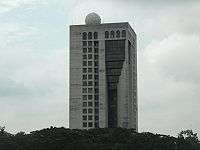Sher-e-Bangla Nagor Thana
| Sher-e-Bangla Nagor শেরে বাংলা নগর | |
|---|---|
| Thana | |
 Sher-e-Bangla Nagor Location in Bangladesh | |
| Coordinates: 23°44.3′N 90°23.1′E / 23.7383°N 90.3850°ECoordinates: 23°44.3′N 90°23.1′E / 23.7383°N 90.3850°E | |
| Country |
|
| Division | Dhaka Division |
| District | Dhaka District |
| Time zone | BST (UTC+6) |
Sher-e-Bangla Nagor (meaning City of the Tiger of Bengal) is one of the thanas of Dhaka city, the capital of Bangladesh.[1] was formed in 2009 from parts of Tejgaon, Kafrul and Mohammadpur thanas.[2] It is located near Agargaon and it is home to the National Parliament. The area has been named after A. K. Fazlul Huq, a renowned statesman and one of the most prominent political figures of Bangladesh who was popularly known as "Sher-e-Bangla" (Tiger of Bengal). Sher-e-Bangla Nagor is a busy commercial and central neighborhood in the city and home to many offices of government and public institutions, educational institutions, banks and financial institutions and shops.
History
.jpg)
The history of Sher-e-Bangla Nagor can be traced back to before the independence of Bangladesh. Sher-E-Banglanagar, Louis I. Kahn's capítol complex in Dhaka, had very good objectives. Those objectives, simply stated, were to make a significant impact locally and internationally and to represent the strong presence of the central government of what was then Pakistan. Seven miles from the city center, the project originally consisted of the National Assembly building and three hostels (that is, temporary accommodations for officials and delegates coming from West Pakistan when parliament was in session). One hostel was for ministers, one for secretaries, and one for the delegates to the National Assembly. The assembly and hostels were grouped together and called the "Citadel of the Assembly."
An early version shows some civic functions, called by the architect the "Citadel of the Institutions," grouped opposite the assembly. None of its constituents was ever built and, in 1971, it was replaced by the National Secretariat of Bangladesh. After 1975, the nation became more stable, and the project was revived. The capítol complex was again seen as a symbol; this time of the new government's stability and accomplishments.[3]
Offices and organizations
The Ministry of Defense and Election Commission of Bangladesh are in Sher-e-Bangla Nagar. Furthermore, Asian Development Bank Bangladesh Resident Mission[4] is across from the Local Government Engineering Department (LGED).[5] Sher-e-Bangla Nagor houses the Department of Immigration and Passports, an attached department under the Ministry of Home Affairs of the Government of the People's Republic of Bangladesh.[6] The National Parliament is located here which is one of the country's prominent aesthetic architectural structures designed by American architect Louis I. Kahn. Bangladesh Institute of Development Studies and Sher-e-Banglanagar Telephone Exchange Dhaka are here as well. Islamic Development Bank Bangladesh branch is right beside BCS Computer City. Bangladesh China Friendship Conference Center,[7] the predominant international convention center in Bangladesh isin Sher-e-Bangla Nagar. The largest conference center of Bangladesh, China Bangladesh Friendship Center was built here in 2002 at a cost of about £35m ($56m).[8]
Educational institutions
One of the country's best agricultural universities, Sher-e-Bangla Agricultural University, is located here. Shaheed Suhrawardy Medical College is near the Ministry of Defense. Some well-known schools like Gonobhaban Government High School, Sher-e-Bangla Nagar Government Boys' High School are here.

Gallery
-
.jpg)
Offices of Members of Parliament
-
.jpg)
National Assembly of Bangladesh
-

Islamic Development Bank, Dhaka
-
.jpg)
Mausoleum of Ziaur Rahman
References
- ↑ "New 6 Thanas in Dhaka". Prothom Alo. Retrieved 2009-09-06.
- ↑ Nahar, Shamsun (2012). "Sher-E-Bangla Nagar Thana". In Islam, Sirajul; Jamal, Ahmed A. Banglapedia: National Encyclopedia of Bangladesh (Second ed.). Asiatic Society of Bangladesh.
- ↑ History of Sher-e-Bangla Nagor
- ↑ ADB-Bangladesh
- ↑ Local Government Engineering Department (LGED)
- ↑ Department of Immigration and Passports
- ↑ Bangladesh China Friendship Conference Center
- ↑ "Chinese woo business in Bangladesh". BBC. 2009-05-30. Retrieved 2009-12-30.